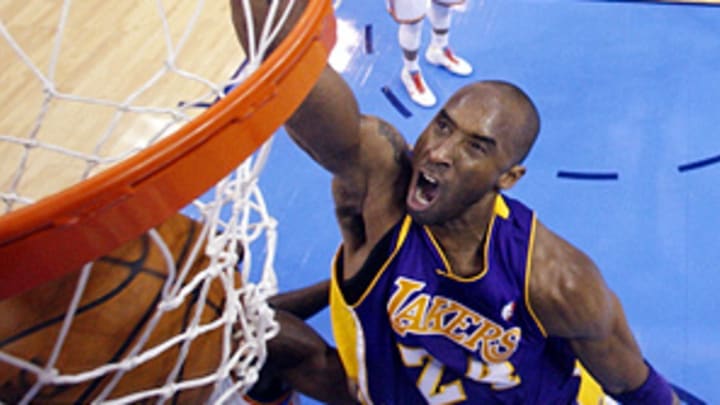Love him or hate him, Bryant's competitive drive worthy of respect


In January 2006 I was assigned to write a story on the NBA scoring race, which at the time was being contested between Kobe Bryant and Allen Iverson, whose teams, the Lakers and the 76ers, were meeting on a Friday night in Los Angeles. Collecting information for that story provided much insight into the killer instinct that has always driven Bryant ... not to mention somewhat of a journalistic comeuppance.
I thought of that eventful weekend on Monday night as I watched Bryant walk off the floor after the Lakers' five-game loss to the Thunder. The defeat at Chesapeake Energy Arena (man, it hurts to write names like that) struck a note of finality for many Lakers followers, suggesting as it did the end for the core of a team that has now been eliminated in the Western Conference semifinals two years in a row.
[Zach Lowe: How can the Lakers improve?]
And it certainly struck a note of satisfaction for the Kobe detractors, who are legion.
Indeed, if pro basketball were a TV soap opera -- and to some extent it is -- each time Bryant enters or exits we would hear villain music in the background. "Man, don't you hate that guy?" I've been asked dozens of times over the years.
The answer is: No, I don't. And it's hard to explain exactly why. Kobe has never been easy to deal with, usually distant and/or elusive when he's not blowing me off altogether, distrustful, always willing to conjure up grievances current and ancient against Sports Illustrated.
But when I think in terms of archetypes, Kobe is not the egotist he represents to so many. Considering all the battles he's been through on the court, he comes across as the grizzled, scarred veteran, the warrior, the One Who Has Endured. OK, he's all of those things along with being The Guy Who Sometimes Shoots Too Much and The Guy Who Sometimes Criticizes His Teammates Too Much.
But, to me, he comes out on the positive side of the ledger, perhaps for the simple reason that I have to respect his unadulterated, undiluted, unrepentant, unyielding cold-blooded competitive temperament. It doesn't get any more complicated than that.
Which brings me to that 2006 anecdote.
Bryant, predictably, wasn't willing to play along with the story idea. "Oh, it's a race now?" he said sarcastically, when I mentioned the scoring race between him and Iverson. Then he went out that night and dusted the Sixers with 48 points, outscoring Iverson by 17 in an easy victory for the Lakers.
As he left the court, Bryant looked triumphantly over at the scorer's table and made a gesture in my general direction, as if to say, Well, if it is a race -- and I'm not saying it is -- we see who's going to win.
And Bryant did win, finishing the season with a 35.4 average to Iverson's 33.0.
That's not the end of the tale. I wrote my piece and planned what I call a "caretaker look-in" on the following night's game against the Clippers. You know, make sure the subject doesn't get hurt, something weird doesn't happen to change the story, etc. I even had my bags packed back at the hotel with the thought that I might make a red-eye flight out of Los Angeles.
Anyway, Bryant had a quiet first quarter -- seriously, what was his motivation to go off again? -- and I tiptoed out of the arena midway through the second, secure that I had the story, and took a cab back to the hotel, which was only a short distance from the Staples Center.
When I walked in, determined to get that red-eye, the game was on in the lobby bar. People were screaming. Kobe was going absolutely bonkers, scoring virtually every time down the court. He had 10 points at halftime but, suddenly, it was 32, then 34, then 36 ... and counting. I jumped into a cab, returned to the arena, zipped into the press entrance and plopped back down in my seat, sweating profusely. I related the story to ESPN's Ric Bucher, who found it hysterical, and sat back to watch the rest of the game, which ended with Bryant's scoring -- wait for it -- 50 points!
That was 98 points in two nights. But of course, it wasn't a race, right, Kobe?
I had intended to tell Bryant the story of my exit and return after the game, making sure to highlight the salient points, put my spin on it, give it the light touch, emphasize that the story was already done and that I would've worked in the Clippers game easily before deadline. But by the time I got to the locker room, Ric had beaten me to the punch. So when I approached Bryant, he started laughing.
"You left?" he said. "You left the game?"
"Yeah, but, see, it had nothing to do with ... " I started to explain.
"I started slow, so you left?" he said. "You gave up on me?"
"It had nothing to do with you start," I protested. "I had already ..."
"Yeah, but I made you come back, right?" he said triumphantly.
"Well," I said sheepishly, "that is true. I was afraid you'd get a hundred."
One postscript: Fifteen days later Kobe went for 81 against the Toronto Raptors, the second-highest single-game total in NBA history. Thank God I was out of town by then.
Jack McCallum is the author of the forthcoming Dream Team, a book about the gold-medal-winning 1992 U.S. Olympic team led by Michael Jordan, Magic Johnson and Larry Bird . Read an excerpt at jackmccallum.net.
